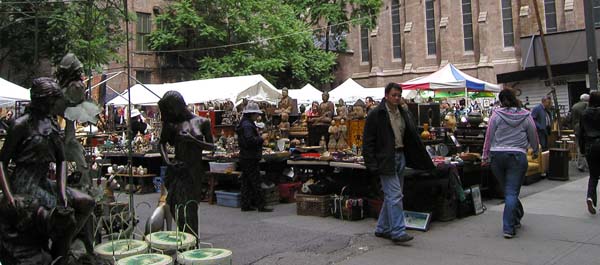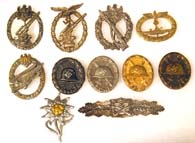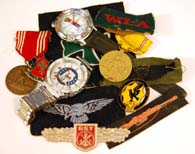Militaria 101: Buyer Beware or Buyer Be Burned

Treasure is everywhere. It is in garage sales, antique stores, flea markets, estate sales and pawnshops. At least that is the sense you might get from watching TV shows such as the long running PBS series Antiques Roadshow, or History Channel’s new Pawn Stars and American Pickers. The former often has people bringing in something they inherited or found at a garage sale, only to discover… it is worth a lot of money.
{default}The latter shows have the "hosts" typically buying items from people, explaining how it really isn’t worth as much as the seller thinks, only to later turn to the camera and gloat (like an eighth-grade boy who caught a glimpse of the girl’s locker room) about the profit they’ll make by reselling an item. It is enough to convince the average viewer to set up a pawnshop or get an old van to scour the countryside for treasure.
 As a critique of the media, it needs to be stressed that these shows are highly edited to increase their respective entertainment value. You don’t see the rest of the time these people spend just trying to scrape out an existence. And even PBS’ Antiques Roadshow only rarely shows those who were truly burnt with a fake. In this case it really isn’t much of a surprise. Who would agree to go on air to show how their believed to be original piece of antiquity was a fake that was made in China only last year, and admit on TV that they paid serious dollars believing it to be real? Not many people, which is why these shows rarely offer these examples.
As a critique of the media, it needs to be stressed that these shows are highly edited to increase their respective entertainment value. You don’t see the rest of the time these people spend just trying to scrape out an existence. And even PBS’ Antiques Roadshow only rarely shows those who were truly burnt with a fake. In this case it really isn’t much of a surprise. Who would agree to go on air to show how their believed to be original piece of antiquity was a fake that was made in China only last year, and admit on TV that they paid serious dollars believing it to be real? Not many people, which is why these shows rarely offer these examples.
This is all very important to consider when deciding to collect militaria, let alone to even consider dealing in militaria. As a collector for about 30 years, this reporter has found many treasures, but I’ve also been burned a few times. I’m not proud to admit that I’ve bought a fake or two, and any serious collector that tells you otherwise is either the exception to the rule, or is flat out lying. The problem is that where big money is involved, there will be those looking to score big with fakes, frauds and copies.
At this point militaria is really a big money hobby when compared to coin collecting, stamp collecting or other memorabilia collecting. It might not be as big money as high-end art or car collecting, but for the size of the hobby, it is fairly big money at least for anything of quality and rarity. Going to a military collectibles show without at least a few hundred dollars in your pocket won’t get you very far, but as with any antique this is to be expected.
 What most new collectors never expect is that there are so many fakes, but the simple fact is that it is very easy to make a good-looking reproduction or copy and pass it off as the real deal. The Internet has also changed the way people find items as well, but this is a double-edged sword in many ways. Sites such as eBay are goldmines, if you know what to look for, so getting to the goldmine requires navigating a minefield first. You need to ask for good photos, find out the return policy and when in doubt you should still get a second opinion. The same could be said of any online dealer site, and remember that lifetime guarantees are only worth the paper they’re printed on, because trying to return an item years or even months after you bought something can be difficult at best. And remember that dealers are in business, so you can’t expect bargains most of the time. Those dealers that sell items way below market value should be avoided for obvious reasons – in other words, if it looks too good to be true…
What most new collectors never expect is that there are so many fakes, but the simple fact is that it is very easy to make a good-looking reproduction or copy and pass it off as the real deal. The Internet has also changed the way people find items as well, but this is a double-edged sword in many ways. Sites such as eBay are goldmines, if you know what to look for, so getting to the goldmine requires navigating a minefield first. You need to ask for good photos, find out the return policy and when in doubt you should still get a second opinion. The same could be said of any online dealer site, and remember that lifetime guarantees are only worth the paper they’re printed on, because trying to return an item years or even months after you bought something can be difficult at best. And remember that dealers are in business, so you can’t expect bargains most of the time. Those dealers that sell items way below market value should be avoided for obvious reasons – in other words, if it looks too good to be true…
So if you can’t find the good stuff online, and the military collectibles shows are too expensive, there are always garage sales and flea markets, right? There are plenty of each to explore – just remember that most flea markets have probably been picked over hundreds of times, and most full-time dealers have a network of "pickers" (just like the guys on the TV show on History). Since dealers usually need to be at military shows on weekends, they rely on pickers to find items for them, and these pickers are up early and more importantly have their own network with the dealers at flea markets. So finding a rare badge or helmet at a flea market isn’t out of the question, but you need to ask yourself how it wasn’t scooped up already.
Garage and estate sales are the same. If you’re not at these as soon as they open, chances are you’ll miss out. Many pickers know to call ahead if a number is provided, and will swoop in to get the goods. The other problem is that these TV shows have provided the average Joe with information that those old items are worth money! This isn’t to say that you can’t still find deals – and I personally have a friend who found a very valuable helmet at a garage sale, and the vet’s wife just wanted to get rid of it (the friend did pay more than she asked to be fair) – but most of the time you should expect just to find old lawn furniture, used baby clothes and the usual stuff that people sell at a garage sale! In all my time collecting I’ve walked out of garage and estate sales with a few bayonets, a couple of badges and a box of U.S. military patches. The big score still eludes me.
 There are of course the "motel" buys – that’s where you get a motel room, place an ad and hope that people bring in valuable collectibles. Some dealers have done OK with these, and some dealers report spending the day sitting in a musty motel room watching TV. There is also some danger involved – and one reason buyers set up at motel rooms is to avoid having strangers come to their homes – but it is obvious that the buyer will have cash, and might possibly be alone and in most states unarmed. So use common sense if considering a motel buy
There are of course the "motel" buys – that’s where you get a motel room, place an ad and hope that people bring in valuable collectibles. Some dealers have done OK with these, and some dealers report spending the day sitting in a musty motel room watching TV. There is also some danger involved – and one reason buyers set up at motel rooms is to avoid having strangers come to their homes – but it is obvious that the buyer will have cash, and might possibly be alone and in most states unarmed. So use common sense if considering a motel buy
The final problem for buying any collectible is knowledge. There is no limit to how much knowledge you can acquire, but it is really tough to know everything well. Many dealers try to offer everything, but even some of the big guys have been burnt – there is the now notorious story of how a very high profile dealer was offered a helmet direct from a vet. It was a holy grail of helmets. The problem was that the helmet later turned out to be a high-end fake, and the dealer was set up by the so-called vet and the vet’s son. In the end, the dealer did the right thing and returned the money after the helmet had been sold and the fakery revealed. But this is just proof that you can’t truly know everything.
The advice here is to get to be part of the collecting community, know the different experts and get opinions. If you’re not sure, ask around. Too many new collectors try to get the jump on everyone else. Sometimes they get lucky, but most of the time they end up with a shelf full of fakes.
But the bottom line is that collecting militaria should be fun. Wasting money on bad items is never fun, so use common sense now that there is a lot of competition — trying to get to the treasure at bargain basement prices probably isn’t going to happen.


“The latter shows have the “hosts” typically buying items from people, explaining how it really isn’t worth as much as the seller thinks, only to later turn to the camera and gloat (like an eighth-grade boy who caught a glimpse of the girl’s locker room) about the profit they’ll make by reselling an item.”
People deliberately lying on television and boasting about how good liars they are and how they have legally cheated money out of a person who is presumably poorer than they are. That’s disgraceful, shameless. In my country people would be outraged by this! American morals seem strange to me.
-Sensemaker
Super bronie sa w tym sklepie…